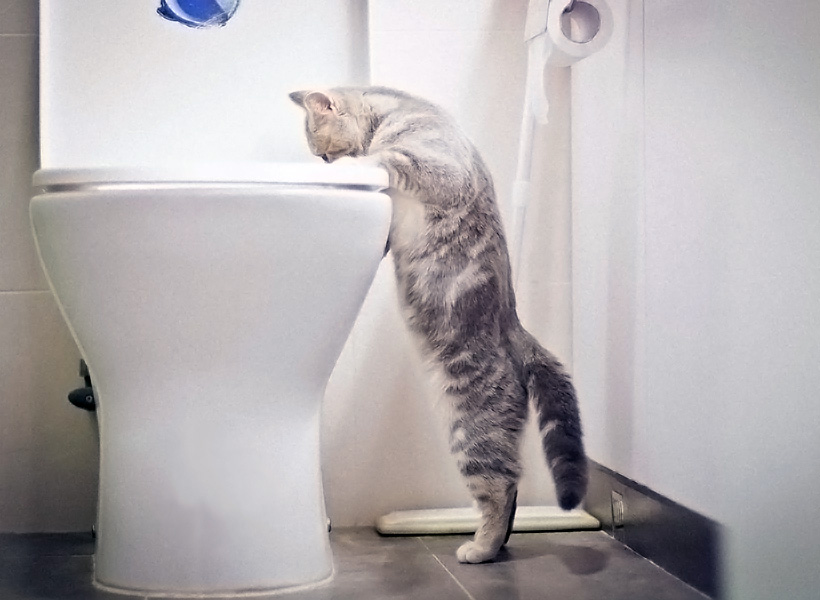The Dangers of Flushing Cat Poop Down Your Toilet - Advice for Better Disposal
The Dangers of Flushing Cat Poop Down Your Toilet - Advice for Better Disposal
Blog Article
This post down below about How to Dispose of Cat Poop and Litter Without Plastic Bags is exceedingly stimulating. You should give it a look.

Intro
As pet cat proprietors, it's vital to bear in mind exactly how we take care of our feline pals' waste. While it may seem practical to flush feline poop down the bathroom, this technique can have harmful repercussions for both the atmosphere and human health.
Environmental Impact
Flushing cat poop introduces dangerous virus and parasites right into the water, presenting a significant threat to water communities. These impurities can adversely impact aquatic life and concession water high quality.
Health and wellness Risks
In addition to ecological issues, flushing cat waste can likewise present wellness risks to humans. Feline feces may consist of Toxoplasma gondii, a bloodsucker that can create toxoplasmosis-- a possibly extreme illness, particularly for pregnant women and individuals with damaged body immune systems.
Alternatives to Flushing
The good news is, there are safer and more responsible ways to take care of pet cat poop. Think about the complying with options:
1. Scoop and Dispose in Trash
One of the most common approach of dealing with pet cat poop is to scoop it right into a naturally degradable bag and throw it in the trash. Be sure to make use of a specialized trash inside story and throw away the waste quickly.
2. Use Biodegradable Litter
Opt for biodegradable pet cat clutter made from materials such as corn or wheat. These clutters are eco-friendly and can be securely thrown away in the trash.
3. Hide in the Yard
If you have a lawn, take into consideration burying pet cat waste in a designated location away from vegetable yards and water sources. Make sure to dig deep sufficient to avoid contamination of groundwater.
4. Install a Pet Waste Disposal System
Purchase an animal waste disposal system particularly designed for cat waste. These systems utilize enzymes to break down the waste, lowering odor and environmental influence.
Conclusion
Liable pet ownership prolongs beyond offering food and shelter-- it also involves proper waste management. By refraining from purging feline poop down the toilet and going with different disposal approaches, we can lessen our ecological footprint and shield human health and wellness.
Why You Should Never Flush Cat Poop Down the Toilet
A rose by any other name might smell as sweet, but not all poop is created equal. Toilets, and our sewage systems, are designed for human excrement, not animal waste. It might seem like it couldn’t hurt to toss cat feces into the loo, but it’s not a good idea to flush cat poop in the toilet.
First and foremost, assuming your cat uses a litter box, any waste is going to have litter on it. And even the smallest amount of litter can wreak havoc on plumbing.
Over time, small amounts build up, filling up your septic system. Most litter sold today is clumping; it is made from a type of clay that hardens when it gets wet. Ever tried to scrape old clumps from the bottom of a litter box? You know just how cement-hard it can get!
Now imagine just a small clump of that stuck in your pipes. A simple de-clogger like Drano isn’t going to cut it. And that means it’s going to cost you big time to fix it.
Parasitic Contamination
Believe it or not, your healthy kitty may be harboring a nasty parasite. Only cats excrete Toxoplasma in their feces. Yet it rarely causes serious health issues in the cats that are infected. Most people will be fine too if infected. Only pregnant women and people with compromised immune systems are at risk. (If you’ve ever heard how women who are expecting are excused from litter cleaning duty, Toxoplasma is why.)
But other animals may have a problem if infected with the parasite. And human water treatment systems aren’t designed to handle it. As a result, the systems don’t remove the parasite before discharging wastewater into local waterways. Fish, shellfish, and other marine life — otters in particular — are susceptible to toxoplasma. If exposed, most will end up with brain damage and many will die.
Depending on the species of fish, they may end up on someone’s fish hook and, ultimately on someone’s dinner plate. If that someone has a chronic illness, they’re at risk.
Skip the Toilet Training
We know there are folks out there who like to toilet train their cats. And we give them props, it takes a lot of work. But thanks to the toxoplasma, it’s not a good idea.

We were shown that write-up about How to Dispose of Cat Poop and Litter Without Plastic Bags through a friend on a different site. Sharing is caring. Helping others is fun. Thank you for your time invested reading it.
Book 24/7 Report this page